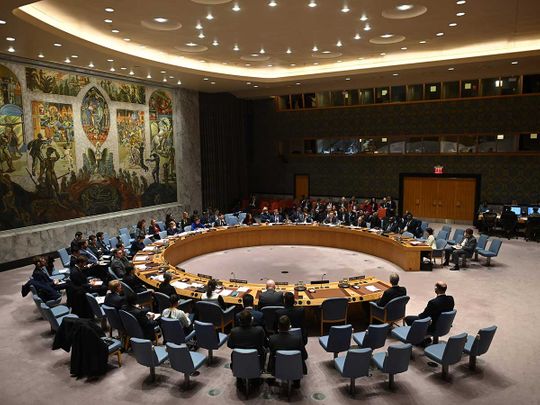
Abu Dhabi: Saudi Arabia on Thursday asked the UN Security Council to take decisive resolutions to deal with SAFER FSO, a deserted oil tanker described as a “floating bomb” that is currently anchored off the coast of war-torn Yemen, and eliminate the threat it poses.
In Saudi Arabia’s speech to the UN Security Council during its virtual meeting Thursday on the situation in Yemen, the Kingdom’s permanent representative to the United Nations, Ambassador Abdullah Al Mouallimi, expressed appreciation for the presidency of the Security Council for this month to hold a session to discuss the dangerous situation associated with the oil tanker (FSO Safer) and the imminent threats posed by this tanker to the environment and the safety of maritime navigation in the Red Sea. He pointed out that the floating oil tanker and the grave risks associated with it threaten to inflict serious damage in the south of the Red Sea and the entire world, as it is located near Bab Al Mandab, which is a vital passage for international maritime navigation between Asia and Europe.
Al Mouallaimi called for not leaving this dangerous situation unaddressed, as the Security Council bears primary responsibility for ensuring the safety and security of the region.
Oil tanker
The ship, a large oil tanker, that has been permanently moored 7km off the Yemeni port of Ras Isa since 1988, is a testament to a time when the Yemen economy was functioning.
Owned by the Yemen oil company, SAFER allows vessels to moor offshore and transfer oil extracted and processed from operations in the Marib oil field in central Yemen. The tanker contains 34 crude oil tanks of different sizes and volumes, amounting to a total capacity of around 3m barrels.
The Saudi Ambassador explained that the risks resulting from the current situation include, but are not limited to, “the possibility of an oil spill in excess of one million litres, which is four times the size of the notorious Exxon Valdez disaster that occurred in Alaska in 1989”, in addition to the possibility of closing Hodeidah port for several months, which could lead to a severe shortage of fuel supplies and other basic needs that are provided to the Yemeni people, and the fishing industry in the region being severely damaged, which may take years to recover.
Non-operational
In effect, a mini-oil export terminal, the ship has not been operational since March 2015 when the region fell under the control of the Houthi rebels.
Built in Japan involving a single hull, experts say is likely to be at particular risk from corrosion and in spite of the production interruptions caused by the conflict, it is thought that it may still contain around 1.14m barrels of crude. The Yemen government points out this is four times the amount of oil released in the 1989 Exxon Valdez oil spill, generally seen as one of the worst man-made environmental disasters in history.
Al Mouallimi added that the marine and environment life and beaches in the Kingdom are negatively and seriously affected, and toxic gases and black clouds emitted from oil leak have damaged agricultural lands and farms along vast areas of Yemen and Saudi Arabia, which may lead to total loss of crops including fruits, grains and vegetables and eventually lead to massive internal displacement of people throughout the affected areas.
He said the Security Council had previously emphasised in its resolution 2511 (2020), and its press statement issued on June 29 (2020), the need to confront the danger associated with this situation and warned of the dire consequences that may result from it if it remained unresolved.
Houthis condemned
He said, “We have taken note of the recent announcement by the spokesman of the United Nations Secretary-General that the Houthi rebels have agreed to allow access to the tanker and inspect it, but we still question the Houthis’ plans and intentions.”
Al Mouallimi expressed the kingdom’s condemnation of the irresponsible actions of the Houthi militia, stressing that these militias continue to exploit the potential disaster of the tanker to blackmail the world, to achieve their political agenda without any consideration for the welfare and safety of the Yemeni people and the region as a whole.
He added, “The Kingdom is ready to take all necessary steps that the council may deem appropriate to deal with the situation, and we would like to draw the Council’s attention to the record of the Houthis, which is full of procrastination and non-compliance with United Nations resolutions.”
Al Mouallimi stressed the need for the Security Council not to allow “reckless and irresponsible behavior to continue, as the Council should find a political solution to the conflict in Yemen on the basis of Security Council Resolution 2216, the Gulf Cooperation Council initiative, and the outcomes of the National Dialogue Conference, which are the elements the international community recognised as a basis for international legitimacy.”








